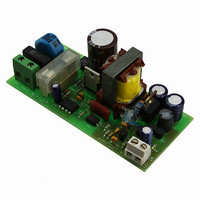NCP1207AADAPGEVB ON Semiconductor, NCP1207AADAPGEVB Datasheet - Page 8

NCP1207AADAPGEVB
Manufacturer Part Number
NCP1207AADAPGEVB
Description
EVAL BOARD FOR NCP1207AADAPG
Manufacturer
ON Semiconductor
Datasheets
1.NCP1207APG.pdf
(17 pages)
2.NCP1207AADAPGEVB.pdf
(5 pages)
3.NCP1207AADAPGEVB.pdf
(8 pages)
Specifications of NCP1207AADAPGEVB
Design Resources
NCP1207AADAPGEVB BOM NCP1207AADAPGEVB Gerber Files NCP1207A EVB Schematic
Main Purpose
AC/DC, Primary Side
Outputs And Type
1, Isolated
Power - Output
24W
Voltage - Output
12V
Current - Output
2A
Voltage - Input
180 ~ 240VAC
Regulator Topology
Flyback
Frequency - Switching
70kHz
Board Type
Fully Populated
Utilized Ic / Part
NCP1207
Lead Free Status / RoHS Status
Lead free / RoHS Compliant
For Use With/related Products
NCP1207AADAPG
Other names
NCP1207AADAPGEVBOS
consumption and the MOSFET’s gate charge Qg. If we
select a MOSFET like the MTP2N60E, Qg equals 22 nC
(max). With a maximum switching frequency selected at
75 kHz, the average power necessary to drive the MOSFET
(excluding the driver efficiency and neglecting various
voltage drops) is:
V
consumption at no- -load will therefore heavily rely on the
internal IC consumption plus the above driving current
(altered by the driver’s efficiency). Suppose that the IC is
supplied from a 350 VDC line. The current flowing through
pin 8 is a direct image of the NCP1207A/B consumption
(neglecting the switching losses of the HV current source).
If I
dissipated (lost) by the IC is simply: 350 V x 2.3 mA =
805 mW. For design and reliability reasons, it would be
interested to reduce this source of wasted power that
increase the die temperature. This can be achieved by using
different methods:
CC
MAINS
The DSS behavior actually depends on the internal IC
To obtain the output current, simply divide this result by
Fsw Qg V
CC2
Figure 13. A simple diode naturally reduces the
: I
1. Use a MOSFET with lower gate charge Qg.
2. Connect pin 8 through a diode (1N4007 typically) to
Fsw = maximum switching frequency
Qg = MOSFET’s gate charge
V
driver
CC
one of the mains input. The average value on pin 8
becomes
example drops to: 223 V x 2.3 mA = 512 mW. If a
resistor is installed between the mains and the diode,
you further force the dissipation to migrate from the
package to the resistor. The resistor value should
account for low- -line startups.
equals 2.3 mA @ T
= V
= F
1
GS
SW
CC
average voltage on Pin 8
V mainsPEAK ⋅ 2
level applied to the gate
2
Qg = 1.6 mA. The total standby power
with:
C
π
bulk
HV
J
= 60C, then the power
. Our power contribution
1
2
3
4
5
1N4007
8
7
6
5
http://onsemi.com
6
8
Skipping Cycle Mode
when the output power demand drops below a given level.
This is accomplished by monitoring the FB pin. In normal
operation, Pin 2 imposes a peak current accordingly to the
load value. If the load demand decreases, the internal loop
asks for less peak current. When this setpoint reaches a
determined level, the IC prevents the current from
decreasing further down and starts to blank the output
pulses: the IC enters the so- -called skip cycle mode, also
named controlled burst operation. The power transfer now
depends upon the width of the pulse bunches (Figure 14) and
follows the following formula:
The NCP1207A/B automatically skips switching cycles
300
200
100
Figure 14. The skip cycle takes place at low peak
1
2
currents which guaranties noise free operation
0
3. Permanently force the V
⋅ Lp ⋅ Ip
Lp = primary inductance
Fsw = switching frequency within the burst
Ip = peak current at which skip cycle occurs
D
burst
When using Figure 13 option, it is important to check
the absence of any negative ringing that could occur
on pin 8. The resistor in series should help to damp
any parasitic LC network that would ring when
suddenly applying the power to the IC. Also, since
the power disappears during 10 ms (half- -wave
rectification), CV
the IC during these holes in the supply
an auxiliary winding. It will automatically
disconnect the internal startup source and the IC will
be fully self- -supplied from this winding. Again, the
total power drawn from the mains will significantly
decrease. Make sure the auxiliary voltage never
exceeds the 16 V limit.
RECURRENCE
= burst width / burst recurrence
2
MAX PEAK
CURRENT
⋅ Fsw ⋅ D burst
WIDTH
CC
should be calculated to supply
with:
CC
level above V
NORMAL CURRENT
MODE OPERATION
CURRENT LIMIT
SKIP CYCLE
CCH
with











